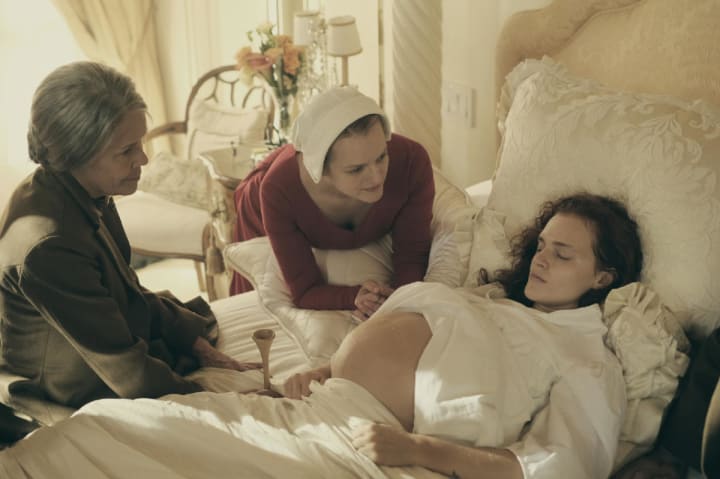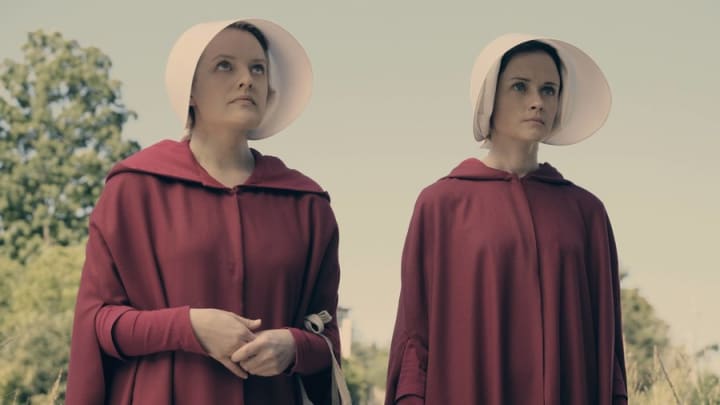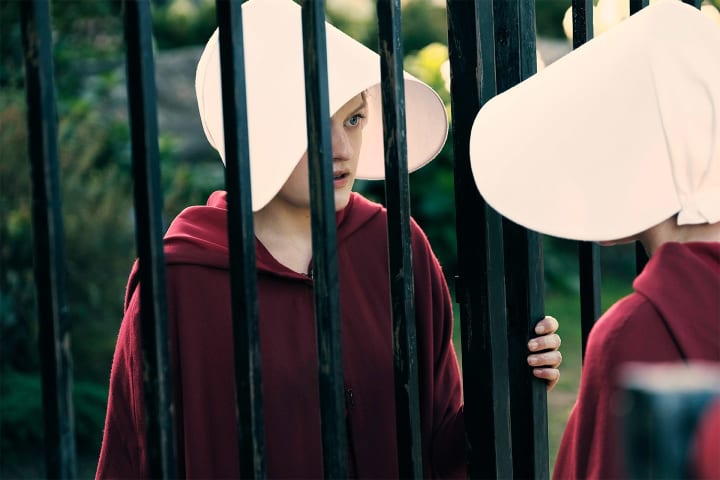This Woman Lived 'The Handmaid's Tale.' Here's Why We Should Listen.
'The Handmaid's Tale' is just supposed to be a dystopian science fiction tale, so why is it so close to what many women in America experience?

If you've been watching the new TheHandmaid's Tale series online, then you already know that it's terrifying for most people. For most women, it's a nightmarish tale that makes us often feel uncomfortable just watching it in its entirety.
In the series, a woman by the name of Offred remembers life before Christian extremists took over America. She is forced to have sex with men in order to bear as many children as possible. She has no rights, no identity outside of being married to her husband. Around her, people oppress others in the name of God.
But, as scary as it is to believe, there are women who live Offred's life in our country. One such woman, who had published an article in The Establishment, explained that she really did live that way when she was raised in a Fundamentalist Christian cult.
Once you hear her story, you'll understand why The Handmaid's Tale needs to be taken as a warning of what happens when we let the wrong people in power - and why we should be terrified of it happening right now.
Haettinger's Story

Haettinger was a woman who went to a conservative Christian college, and was raised to be a helpmeet for a future husband. Helpmeets, in her Fundamentalist Christian religion, are wives. Their sole purpose in life is to "help meet" whatever needs their husbands may have - and to raise children in a biblical manner.
According to her, she was part of a Christian offshoot that is known as the Quiverfull movement; a movement that basically encourages wives to have as many children as possible. She was one of nine siblings, and was expected to help raise children, do chores, and just serve her father.
When she would come of age, her parents would pick out someone who they felt was appropriate for her. Then, she'd marry that guy, and basically be his personal servant. Much of it, as Haettinger explained, had strong political undertones:
"Have children and raise them in this aggressively conservative faith, and then there will be more “true” believer Christians in the world to bring about cultural revolution in the name of Jesus Christ. Children like me were raised to see life as apocalyptic, and ourselves as serving on the front lines of a culture war to make America Christian."
Much like women in the book, she wasn't allowed to have email addresses, bank accounts, or really any items that would give her freedom. If that doesn't sound too similar, consider the following confession:
"I even participated in a super-conservative worship church dance troupe for young women, called His Handmaids — again a term taken from the Bible, from the Virgin Mary’s response to the angel Gabriel telling her she’s going to be pregnant with the Messiah, which some translations open with “I am the Lord’s handmaiden, let it be unto me as you say.”"
The fact is that she grew up this way throughout the 80s and 90s, and she didn't think it was that unusual until she went to college and read The Handmaid's Tale. (Yes, the book by Margaret Atwood.)
Stripped of Identity

Women in Haettinger's community, much like the ones who were in Atwood's book, were stripped of identity. Jewelry, hair dye, makeup, and any other identifying styles were removed from them as part of the congregation.
Everything the church did was to reinforce the fact that women did not live for themselves; they lived to serve men and the community. According to Haettinger, she wasn't alone. The entire movement is decades old, and stems from Jerry Falwell's "Moral Majority" - a movement that can be traced back to 1971.
The Moral Majority was a movement that started off strongly right wing, praised anti-homosexual movements, claimed that HIV was "God's way to remove gays," and encouraged violent protests against abortion providers. For the people in the Moral Majority, Christianity is a political statement and a way to increase power.
Tyranny of the Majority

The Moral Majority was, in fact, a minority. They knew this, and they also know that they have to go through more extreme, well-planned methods to get the power they want in their so-called Christian crusade. Haettinger explained that the amount of policies this group lobbied against is staggering.
As of right now, the Moral Majority was credited with lobbying against things like providing an equal rights clause for women in the constitution. They are also known for promoting the "War on Drugs," getting Title IX exclusions for Christian Universities, and promoting anti-homosexual policies. Haettinger said:
"The United States is one of the last remaining countries in the world without a constitutional clause that protects the rights of women as full and equal citizens with men, and this prevents us from participating in key international coalitions against gender discrimination (like CEDAW, which we haven’t ratified either). The Moral Majority effectively took the United States backwards a century policy-wise — and we still haven’t fully recovered."
Not a Handmaid

Haettinger, upon reading The Handmaid's Tale, saw herself as Offred - and as a result, rebelled against her religion. She began to realize she did not want kids, and she definitely didn't want to go through the hard work that she endured while being her mother's right hand girl.
As a result, her marriage dissolved after her husband asked her to have kids to "fix" the marriage. She did the unspeakable and divorced her husband. This led to an almost-immediate expulsion from her community and church.
The blowback also extended to her family, as Haettinger said:
"When I ended my relationship to my father shortly after I got divorced, it was because he and I reached a crossroads where he had to choose to treat me according to his religious ideology or to treat me like a human, his daughter, his firstborn. He chose his ideology, and continued to use it to manipulate and mistreat myself and my mother and my siblings."
Scarily, this isn't uncommon among women who choose to refuse the Quiverfull lifestyle. Many never speak to their parents again, and many end up falling into a deep depression because of how betrayed they feel by the abandonment of their community.
A Problem Long in the Making
Many people are balking at the numbers of Americans who are trying to force through legislation that seems oddly reminiscent of the rules Offred faced in Atwood's story. Haettinger is not one of them.
" I was raised to be a helpmeet in a world like Offred’s, and watching (white, middle class) liberals around me be shocked and unnerved by the election results has been curious for me. Didn’t they know this has been in the works for decades? I didn’t come out of nowhere, and neither did Trump, and nor did The Handmaid’s Tale."
The Moral Majority movement may be dead in the most common senses of the word, but Quiverfull is far from dead. In fact, it's a growing movement. Additionally, many white supremacy groups are now adopting the same strategies that the Moral Majority brought about.
Currently, there are many people in these movements who see nothing wrong with the world shown by The Handmaid's Tale. There are groups of Quiverfull girls out there who are currently conflicted with the brainwashing they've had their entire lives, who are too terrified to actually get out of their cult families.
Unfortunately, the left is ill-equipped and ill-prepared to actually figure out a way to deal with such a volatile, heavy-handed group. So, if we don't listen to people like Haettinger about what can be done to get people out of Quiverfull, the tale of Offred will be one lived by every woman in America.
About the Creator
Ossiana Tepfenhart
Ossiana Tepfenhart is a writer based out of New Jersey. This is her work account. She loves gifts and tips, so if you like something, tip her!






Comments
There are no comments for this story
Be the first to respond and start the conversation.